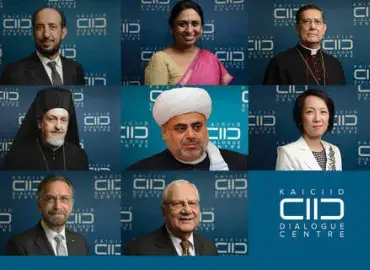"Protect the Vulnerable": A Message From KAICIID's Secretary General in a Time of Crisis
The COVID-19 outbreak presents humanity with an unprecedented challenge, not just for those who contract the disease, but for all those facing problems associated with its collateral effects – economic disruption, unemployment, a breakdown in care provision and the risk of social and political unrest and dysfunction.
Much of the disruption is caused by the need to ensure that there is sufficient clinical and social care capacity to protect the most vulnerable – the old, the infirm, those who live alone. Mass isolation of those who are not at particular risk from the disease itself from a clinical viewpoint is a necessary step towards looking after those who are.
The world is being asked to reinvent itself and change its priorities, at great cost to established patterns of human interaction, to the global economy and trade and employment, so that the vulnerable might be protected. In a world increasingly inclined towards self-interest, we can see the rebirth of some of the noblest human instincts as reflected in numerous cultures and religions.
KAICIID is an organisation that believes in dialogue, especially interreligious and intercultural dialogue. All of its global operations are based on the principle of putting aside personal perspectives and priorities in an effort to understand and engage with others. This principle is enshrined in the nature of KAICIID’s programmatic outlook, supported by a governance structure that includes a Board whose representatives come from five religions and an Advisory Forum representing many more.
All religions in particular have at their core a duty to protect the weak and the vulnerable. Prophets and religious figureheads from the respective religious traditions, religious texts and teachings all point to the importance of marginalised people as pathways to the Divine.
Religious leaders and their institutions, faith-based organisations and believers share a heightened duty of care at this time towards protecting the weak. They can be most effective when working hand in hand with a variety of partners, across religions and cultures, and across different kinds of organizations at all levels.
I applaud the numerous initiatives that are already underway to ensure that this charitable impulse is preserved and expanded in this time of crisis. In many parts of the world, where security, infrastructure, healthcare and a social safety net are lacking or weak, it is the religious leader and faith communities who take on or supplement responsibilities ordinarily reserved to governments and municipalities.
In many parts of the world during this crisis, religious charities, institutions and believers are seeking out the vulnerable, liaising with local authorities, checking that the isolated or at risk have provisions and the comfort of knowing that they are not alone, and offering sympathy to those who have lost loved ones.
Many religious leaders with pastoral oversight, and many believers, will be feeling a sense of dislocation as the protocols regarding this disease close down collective worship. But individual prayer provides equal access to the Divine. Isolated groups praying together will discover a new kind of spiritual solidarity. Believers do not need to be in the same room to experience a sense of collective religious identity. And many have access to social media and phones to reach out and care for each other and the most vulnerable and even engage virtually in joint worship.
Despite operational difficulties, be assured that KAICIID will do all it can, using its global network of relationships at pastoral as well as policymaking levels, to preserve a spirit of solidarity among faith communities and their partners, both religious and otherwise, reflect their experiences throughout this crisis, and facilitate conformity with best practices as we fight the effects of this pandemic.
In the meantime, I encourage everyone to continue to find ways to fulfil the universal call of all the religions and cultures – to seek out and protect the vulnerable.
In response to current developments concerning the Coronavirus (COVID-19) outbreak, and reflecting on the latest…


